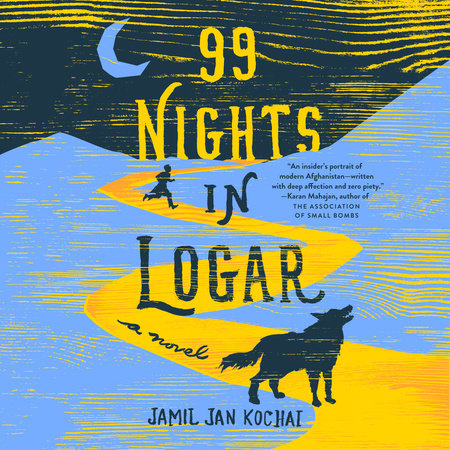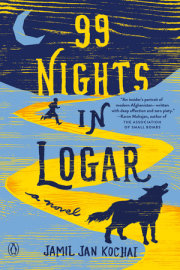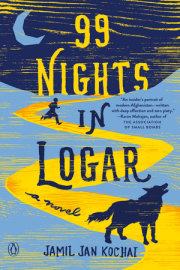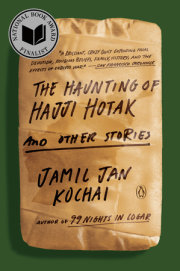On the Thirty-Second Morning
Budabash got free sometime in the night.
We didn’t know how. Just that he did and that we needed to go and find him. Me and Gul and Zia and Dawood heading out onto the roads of Logar, together, for the first time, hoping to get Budabash back home before nightfall.
This all happened only a few weeks into my trip, my family’s homecoming in the summer of ’05, back when it cost only a G to fly across the ocean, from Sac to SF to Taipei to Karachi to Peshawar all the way up to Logar, where, at the time, though it wasn’t dead, the American war was sort of dozing, like in a coma, or as if it were still reeling off a contact high from that recently booming Afghan H, leaving the soldiers and the bandits and the robots almost harmless. So that all that mattered then for a musafir from America was how he was going to go about killing another hot summer day.
Gulbuddin said it’d be a four-man operation.
He said it in Pakhto because my Farsi was shit.
“You see,” he told me, Zia, and Dawood as we huddled in the orchard before our chase, “more than four and we’ll look like a mob, but any less and we might get jumped.”
Gul sat at the head of our circle, twirling one end of the thick black mustache his older sisters were always trying to tear from his lip because it made him look too much like the beautiful Turkish gangsters from their soap operas. From where he was sitting—up against the mud wall that ran between the courtyard and the orchard—he could spy on all the apple trees and the cow’s pen and the big blue gate and even the very corner of the orchard where Budabash once sat and slept and ate my god-damn finger.
Gul was my little uncle. About fourteen. The oldest of our bunch.
“What about four and a half?” I said, thinking about my little brother.
“What did I
just say, Marwand?”
“More than four is a mob,” Dawood answered.
“But an extra half might come in useful,” I said.
“Not the half you’re talking about,” Dawood said, squatting at the farthest edge of our circle, taking up too much space.
Dawood was my other little uncle. Around twelve years old. Same as me.
“Listen, fellahs,” I went on. “Five is a good number. Five pillars. Five prayers. Five players on a basketball team.”
“Only five?” Zia asked.
“Well, is it four and a half or five?” Dawood asked.
“Futball is better,” Zia said. “In futball everyone gets to play.”
“What do you think?” I looked to Zia. He was my cousin. Rahmutallah Maamaa’s oldest kid.
Probably thirteen—though you could never be too sure with the kids in Logar. But Zia just shrugged his skinny shoulders and aimed the barrels of his fingers at Gulbuddin. “Chik, chik,” Zia said, “pow, pow,” and pulled his triggers twice.
Gulbuddin nodded at Zia and pressed down on the air with his hands. His eyes, green like duck shit, shifted from us, to the gate, to the courtyard, where the rest of the family still slept.
We quieted down.
“We’ll put it to a vote,” he said. “Raise your hand if you want Gwora to come along.”
Dawood rubbed his skinned head as if he were going to vote for Gwora but couldn’t make up his mind.
Zia’s scrawny fingers stayed nestled in his lap, counting out the ninety-nine names of Allah.
Gul didn’t even move.
Only my busted hand went up into that morning chill.
“Well, fuck,” I muttered in English, and relented to the will of the jirga.
With my little brother rejected, I didn’t say much else for the rest of the meeting as they shifted, almost rapid fire, from one topic to the next: how to start, where to look, where to stop, where Dawood would sniff, when Zia would pray, what Gul would chance if we met a marine or a djinn or a bandit or one of our other uncles who’d already gone ahead of us on the chase.
“We go out. We find Budabash. We bring him home,” Gul said. “Simple as that. Dawood does some sniffing. I ask a few questions. Zia says a few prayers. And if we run into Rahmutallah, Marwand makes sure we don’t get whupped. Right, Marwand?”
Rahmutallah Maamaa—my oldest uncle—was already out on the road looking for Budabash. Had he caught us that day, I was supposed to tell him that our mission was my idea.
“Okay,” I said. “I’ll lie.”
“You swear to God you’ll lie?” Dawood said. “Don’t say it unless you mean it,” Gul said. “You’ll be bound by Allah,” Zia added.
Gul and Dawood made pistols with their fingers and pointed them at my chest. I made a pistol too but put it to the temple of my head.
“Wallah,” I said, cocking my finger. “I won’t snitch.”
Gul laughed and reached for my hands and put them between his own. “All right,” he said, being careful with the gauze wrapped around my torn finger. “We were just joking, you see, a joke for the road. You understand?”
I said that I did.
After we gathered our supplies—biscuits and apples, four small knives wrapped in butcher paper, eight water bottles, the first siparah of the Quran, a packet of matches, two notebooks me and Gwora filled up with our observations on Budabash, four bundles of rope, duct tape, and my Coolpix—we headed out toward the big blue gate, and it was there, at the threshold of the gate and the road, the compound and the village, that Gwora, my little brother, caught me slipping.
He stumbled into the orchard, his arms filled with a jumble of papers and notebooks, howling about our work, our agreement, and pleading for me to take him along. I explained to Gwora in English, real calm, that he couldn’t come, that it wasn’t up to me; but he wouldn’t listen, wouldn’t understand, and all that time the fellahs were watching me from the gate, whispering to one another in Farsi, until I told him one last time, in Pakhto, why he had to stay home, and when that also didn’t work, I
showed him why. It didn’t take long.
After the whupping, I left Gwora in the orchard all crumpled up, trying again and again not to cry, while me and the rest of the fellahs headed out onto the roads of Logar to search all day long for the wolf-dog who, just a few weeks ago, had bitten the tip off my index finger.
Copyright © 2019 by Jamil Jan Kochai. All rights reserved. No part of this excerpt may be reproduced or reprinted without permission in writing from the publisher.











